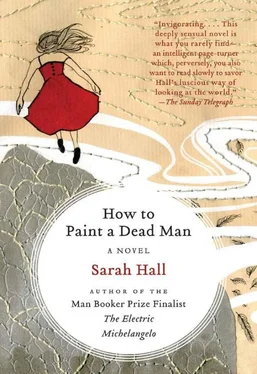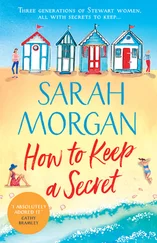Sarah Hall - How to Paint a Dead Man
Здесь есть возможность читать онлайн «Sarah Hall - How to Paint a Dead Man» весь текст электронной книги совершенно бесплатно (целиком полную версию без сокращений). В некоторых случаях можно слушать аудио, скачать через торрент в формате fb2 и присутствует краткое содержание. Год выпуска: 2009, Издательство: Harper Perennial, Жанр: Современная проза, на английском языке. Описание произведения, (предисловие) а так же отзывы посетителей доступны на портале библиотеки ЛибКат.
- Название:How to Paint a Dead Man
- Автор:
- Издательство:Harper Perennial
- Жанр:
- Год:2009
- ISBN:нет данных
- Рейтинг книги:4 / 5. Голосов: 1
-
Избранное:Добавить в избранное
- Отзывы:
-
Ваша оценка:
- 80
- 1
- 2
- 3
- 4
- 5
How to Paint a Dead Man: краткое содержание, описание и аннотация
Предлагаем к чтению аннотацию, описание, краткое содержание или предисловие (зависит от того, что написал сам автор книги «How to Paint a Dead Man»). Если вы не нашли необходимую информацию о книге — напишите в комментариях, мы постараемся отыскать её.
, Sarah Hall, "one of the most significant and exciting of Britain's young novelists" (
), delivers "a maddeningly enticing read... an amazing feat of literary engineering" (
).
How to Paint a Dead Man — читать онлайн бесплатно полную книгу (весь текст) целиком
Ниже представлен текст книги, разбитый по страницам. Система сохранения места последней прочитанной страницы, позволяет с удобством читать онлайн бесплатно книгу «How to Paint a Dead Man», без необходимости каждый раз заново искать на чём Вы остановились. Поставьте закладку, и сможете в любой момент перейти на страницу, на которой закончили чтение.
Интервал:
Закладка:
It should only take a few minutes, and then you will know. The world will arrange itself around this information. It will make way for another temporary pulse, or it will retain its position, adjusting the count elsewhere around the world as people pitch in and out, headlong, hundreds of them by the second. The indicator paper is clear and prepared. You think of bromide emulsion, light sensitivities, of waiting for a face to develop in a photograph. It’s like waiting to know if the image has succeeded or failed. The device is a viewfinder, an observatory. And in a few minutes you will know who is or is not there.
You feel no discernible emotion either way, and you are not sure what you will feel when the result comes in. Terror? Elation? Disappointment? Or something in between? You will have to wait and see.
The funny thing is, you’ve been thinking so long and hard about death that you’ve lost sight of its fraternal twin, its obverse pole. This is the prerogative of grief you suppose. There have been times you’ve not realised you were crying, until you put your hand to your face and it came away wet, until you noticed that someone was looking at you curiously, the concerned stranger on the train, or the woman in the supermarket who offered you a tissue. You have been so consumed that you’ve almost forgotten about the other side, the affirmation, the positive stroke. Life.
What is it really? A term. A condition. A state of being, for a while, animate. A state that is no longer radically felt, perhaps, that has no hard mortal slap, day after day, no jeopardy, nothing hanging in the balance — at least not in this safe little bolthole of the globe. There is no requirement to kill, no murdering for the scraps. Even the bloody bookends of birth and death are dulled with morphine, epidural, euthanasia. The occasional reminders of what it is to be anatomised, what it is to be made of particles, neurons, nerves, and senses, what it means to be homo sapiens — the car accident, the toxic oyster, the bolt rattling out of the rollercoaster — are few and far between. Ecstasy and agony are now on sale. Pay for the ride, pull the parachute cord, pop the pill, there will be insurance of some kind, a safety net below. The brain fires but the true biological impetus, of pain and desire, of hunger and fear, is missing. Because human beings can’t be given happiness, after all. They have to fight for it, sprint for it, get close to the edge for it. They have to rut for it, permit the striking of those dutiful, savant gametes. So you go on, in abstraction, until something wakes you up — a bomb, an accident, a close miss. So you fuck him, not for love, but because you both understand that death equals life. Perhaps.
In a few minutes you will know. You will know the consequences of your actions, the result of your programme to fulfil yourself, the primitive attempt to establish your presence. Here you are, waiting for a sign, waiting to know something more about yourself. What you already know is this: you reside at a privileged set of coordinates. You have a partner who loves you, employment, a house. You have parents, talents, a salary, a vote, and firing synapses. Hitherto your body has not let you down — breasts, cervix, eyes, ovaries, cerebral functions, immune system, lungs, and heart: nothing has yet malfunctioned, no dire failure has occurred, beyond the gentle degradation of ageing. If you choose to, you will live. And in your hands might be another life.
When you came home from the gallery an hour ago you thought about telling Nathan everything. You thought about telling him that you are no longer you, the woman he knew and trusted, that you are a different person now, capable of the worst possible damage. You thought about confessing, telling him about Tom and your dark obsession, the hotel rooms, the test kit in your bag, everything.
You took out your key, opened the flat door. Nathan was home, of course. Hiya, love. He came out of the kitchen holding a glass of wine. Not staying late tonight then? He passed you the glass stem, kissed your cheek. You have this. I’ll make dinner. You shrugged off your coat, sat on the couch. You looked around the place. Everything was familiar, the Victorian fire with its trivets and tiles, the flax-green walls, bookcases, furniture, your photographs, hanging in meaningful series, all of which you had chosen, all of which you could leave.
The door of the second bedroom was open. Sitting on the corner of the table was your Leica, and a folder of contact sheets for an overdue commission. Steam was coming from the kitchen, the smell of garlic. You put your bag on the couch beside you, took a sip of wine, reached for the remote and turned on the television. On one channel was a film set in the Australian outback. An aboriginal woman had had her child stolen; she was beating her head with a rock. On another was a programme about trepanning; people were drilling into their foreheads, blazing in towards the tender frontal lobes. They thought it would bring them wisdom. The hundred sexiest music videos. A hospital drama, someone’s hand about to be amputated. You can’t do it, you can’t do it to me, the patient was screaming.
You kept pressing the arrow key on the remote, passing up through the channels until you reached those that were blank. In the corner of the screen was the word scrambled. You wondered if this was what Nicki saw behind her eyelids-a dark visor, a projection of nothing. You wondered how her life feels. Like an endless intermission perhaps, a continuation of those forty-five airless minutes on the moor, lying in the winter snow. The nurse once told you her muscles are so wasted that if she woke she would not be able to use them. Imagine a moth carrying a tractor on its back, she had said to you. You turned off the television and thought of Nicki’s hair, kept glossy by solutions of proteins and minerals dripped down into her, and by the brushing and brushing of her family.
You thought about going for a run. You imagined the cool twilight slipping past you on the heath, the city rotating under your soles. You drank your wine quickly, stood up, and went into the spare room. The phone was flashing red. The console told you there were three new messages. You picked up the rangefinder, dusted it off. Inside the heavy case you knew Danny would be sitting outside the railway station surrounded by birds. His arms would be stretched along the back of the bench. He would be smiling. You shut your eyes and thought about his first bike, the one he’d had when he was a kid, the one with the long handlebars that had rattled over potholes on the farm roads and flung him off into the thistles when he hit a ditch on the moor. You thought about him laughing, even as he lay there getting stung. Danny.
Nathan called from the kitchen. You’ve got a few minutes, I’m just about to put the pasta on. You took the film cartridge out of the bottom of the camera, worked the casing open and drew the thin plastic strip out into the light. You laid it on the studio table, where it re-curled, set the Leica down next to it and went back into the lounge. You took the paper pharmacy packet out of your bag and locked yourself in the bathroom.
You hold the plastic device in your hands. It weighs almost nothing. The floor tiles are small and cold. In the bathroom mirror your reflection is returning your gaze. London is outside the window. The streetlights are coming on, making the sky orange, and the traffic is continual, planes and helicopters passing overhead. Either side of this building, millions of people live, and millions die. The world can accommodate your situation, as it accommodates all situations. And your body will keep explaining to you how it all works, this original experiment, this lifelong gift. Your body will keep describing how, for the time being at least, there is no escape from this particular vessel. These are your atoms. This is your consciousness. These are your experiences — your successes and mistakes. This is your first and final chance, your one and only biography. This is the existential container, the bowl of your life’s soup, wherein something can be made sense of, wherein there is a cure, wherein you are.
Читать дальшеИнтервал:
Закладка:
Похожие книги на «How to Paint a Dead Man»
Представляем Вашему вниманию похожие книги на «How to Paint a Dead Man» списком для выбора. Мы отобрали схожую по названию и смыслу литературу в надежде предоставить читателям больше вариантов отыскать новые, интересные, ещё непрочитанные произведения.
Обсуждение, отзывы о книге «How to Paint a Dead Man» и просто собственные мнения читателей. Оставьте ваши комментарии, напишите, что Вы думаете о произведении, его смысле или главных героях. Укажите что конкретно понравилось, а что нет, и почему Вы так считаете.












